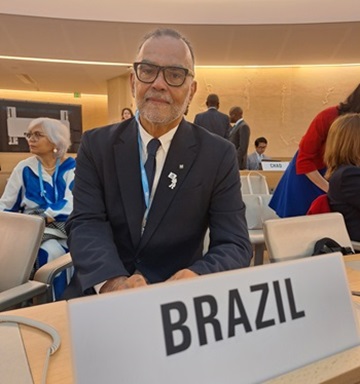The 78th World Health Assembly (WHA), the highest decision-making body of the World Health Organization (WHO), began this Monday (19/5) in Geneva, Switzerland.This edition is themed One World for Health and will run until May 27. Fiocruz, in keeping with tradition, is once again actively participating in the meeting as part of the Brazilian government delegation. Throughout the week, member states will discuss topics such as health emergencies, financing and pandemic preparedness.
In addition to the official agenda, there will be a series of side events during the WHO meeting, in which important dialogues are expected, including the establishment of potential partnerships and joint efforts in defense of relevant global health issues.
Fiocruz was highlighted in the Assembly's opening speech delivered by WHO Director-General, Tedros Adhanom. He explained that the Research and Development (R&D) for Epidemics is being managed by Open Access Collaborative Consortia, which cover 12 pathogen families and involve over 5,000 scientists.
#Fiocruz #WHA #78WHA #worldhealthassembly pic.twitter.com/6bA1Lj6qzU
— Fiocruz in English (@fiocruz_en) May 19, 2025
In addition to the official agenda, there will be a series of side events during the WHO meeting, in which important dialogues are expected, including the establishment of potential partnerships and joint efforts in defense of relevant global health issues.
Fiocruz was highlighted in the Assembly's opening speech delivered by WHO Director-General, Tedros Adhanom. He explained that the Research and Development (R&D) for Epidemics is being managed by Open Access Collaborative Consortia, which cover 12 pathogen families and involve over 5,000 scientists.
Adhanom praised the work of Fiocruz — the only institution mentioned by name, which has been part of the WHO Hub for Pandemic and Epidemic Intelligence, in Germany, since 2023. “I would like to especially thank the Oswaldo Cruz Foundation in Brazil – Fiocruz, which leads one of these consortia. I thank Fiocruz for the partnership and offer my warm congratulations on its 125th anniversary,” said Tedros. “Happy birthday, Fiocruz,” he added in Portuguese.
“Tedros’ speech is a great honor for us,” said the president of Fiocruz, Mario Moreira. “He demonstrated a surprising level of knowledge about Fiocruz, even recalling his experience with the Foundation during his time as Minister of Health of Ethiopia. This recognition, expressed in front of all health ministers present at the Assembly, further emphasizes the value of Fiocruz's role in global health.”

In terms of lessons learned from COVID-19 and other health emergencies, Adhanom also indicated that WHO is supporting countries in strengthening their genomic surveillance capabilities. “Through our Pandemic and Epidemic Intelligence Hub in Berlin, the International Pathogen Surveillance Network now connects 350 organizations across 100 countries,” he stated.
During his speech, the WHO Director-General outlined the three fundamental pillars of the event: 1) Promoting health and preventing diseases by addressing root causes (such as air, food, and water quality, as well as living and working conditions); 2) Equitable access to essential health services; 3) Supporting countries in protecting health through prevention and rapid response to health emergencies. In addition to the topic of emergency preparedness, others were highlighted, such as climate change, maternal and child health, vaccine production, diagnostic kits and other supplies, tobacco control and conflict situations and their consequences for global health.
According to the president of Fiocruz, Mario Moreira, who is part of the delegation led by Brazil’s Ministry of Health, Fiocruz arrives at this Assembly during a moment of consolidated global engagement. “We have production capacity in pharmaceuticals, vaccines, and diagnostic kits, while our team of specialists allows for high-level mobilization in response to health emergencies — all without losing our focus on infectious diseases. We collaborate with all continents. We are strongly engaged in South-South solidarity among nations, while also maintaining South-North collaborations. We are recognized as a WHO Collaborating Center in various areas, and we lead important international networks such as the Pasteur Network. For us, the Assembly is a space to broaden dialogue with global partners and to continue our defense for reducing health disparities,” he pointed out.
Brazilian Minister of Health, Alexandre Padilha took part in the Assembly’s opening plenary and emphasized the importance of multilateralism in addressing global health challenges, such as climate change and pandemics. He reiterated the Brazilian government's support for WHO. “The greatest lesson of this last decade is that no country alone can care for the health of its people. As President Lula says, no president was elected to be the world’s sheriff. We reaffirm our support for multilateralism. Brazil says yes to the WHO,” said Padilha. “The mission of this decade is that we need more WHO, not less.”
The minister added that it was only through multilateralism that challenges such as insulin shortages caused by disruptions in supply chains could be tackled. He also highlighted progress in building a global alliance against hunger, poverty, and the elimination of neglected diseases. In conclusion, Padilha invited everyone to attend COP30, which will take place in Brazil, in Belém (Pará), in November 2025, focused on Climate Change.
125 Years of Fiocruz
The 78th WHA will also mark the beginning of the celebrations of the Fiocruz’s 125th anniversary on May 25, with a ceremony taking place on Tuesday (20/5). The event is supported by long-time partners such as the Pasteur Network, the UN Foundation, and Unitaid, and will be attended by national and international authorities. This celebration is part of the side events held in parallel with the WHA.
According to Mario Moreira, the Foundation brings to the Assembly a vast experience in cooperation, which will drive opportunities for dialogue and partnerships. “It is a great joy to be at the event and to represent the Brazilian Unified Health System (SUS) at a moment when Fiocruz celebrates its 125th anniversary,” he emphasized.


